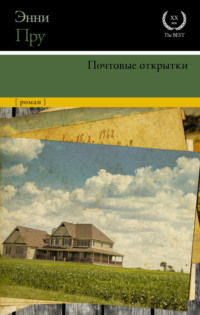
Полная версия
Barkskins



Copyright
4th Estate
An imprint of HarperCollinsPublishers
1 London Bridge Street
London SE1 9GF
www.4thEstate.co.uk
First published in Great Britain by 4th Estate in 2016
Copyright © 2016 by Dead Line, Ltd
Annie Proulx asserts the moral right to be identified as the author of this work
Cover design by Jaya Miceli
Photograph © Anderson & Middleton Company
A catalogue record for this book is available from the British Library.
These stories are works of fiction. Names, characters, places and incidents either are the product of the author’s imagination or are used fictitiously. Any resemblance to actual persons, living or dead, events or locales is entirely coincidental.
All rights reserved under International and Pan-American Copyright Conventions. By payment of the required fees, you have been granted the non-exclusive, non-transferable right to access and read the text of this e-book on-screen. No part of this text may be reproduced, transmitted, down-loaded, decompiled, reverse engineered, or stored in or introduced into any information storage and retrieval system, in any form or by any means, whether electronic or mechanical, now known or hereinafter invented, without the express written permission of HarperCollins.
Source ISBN: 9780007232000
Ebook Edition © June 2016 ISBN: 9780007290147
Version: 2017-03-17
Dedication
To the memory of my high school teacher
Elizabeth Ring,
Maine historian, scholar and educator,
who excited in me a lifelong interest in historical change
and shifting disparate views of past and present.
To the memories of my sister Joyce Proulx Kostyn,
brother-in-law John Roberts,
writers Ivan Doig, Dermot Healy, Aidan Higgins
and wildlife biologist Ronald Lockwood.
And for barkskins of all kinds—
loggers, ecologists, sawyers, sculptors, hotshots,
planters, students, scientists, leaf eaters, photographers,
practitioners of shinrin-yoku, land-sat interpreters,
climatologists, wood butchers, picnickers, foresters,
ring counters and the rest of us.
Epigraph
Why shouldn’t things be largely absurd, futile, and transitory? They are so, and we are so, and they and we go very well together.
George Santayana
In Antiquity every tree, every spring, every stream, every hill had its own genius loci, its guardian spirit. These spirits were accessible to men, but were very unlike men; centaurs, fauns, and mermaids show their ambivalence. Before one cut a tree, mined a mountain, or dammed a brook, it was important to placate the spirit in charge of that particular situation, and to keep it placated. By destroying pagan animism, Christianity made it possible to exploit nature in a mood of indifference to the feelings of natural objects.
Lynn White, Jr.
Contents
Cover
Title Page
Copyright
Dedication
Epigraph
I. forêt, hache, famille: 1693–1716
1. Trépagny
2. clearings
3. Renardette
4. guests from the north
5. the wedding
6. Indian woman
7. bûcheron
II. “… helplessly they stare at his tracks”: 1693–1727
8. Forgeron
9. Les Quatrains de Pibrac
10. all the world wishes to go to China
11. Dutch sea captain
12. Steenarend
13. garden of delightful confusion
14. risk
15. hair
16. “a wicked messenger, fallen into evil …”
17. “unto a horse belongeth a whip”
18. reunion
19. “Exitus in dubio est”
20. rough deed
21. shifting ground
22. disappearance
III. all these woods once ours: 1724–1767
23. dogs and villains
24. Auguste
25. sense of property
26. Mi’kma’ki
27. blood kin
28. the secret of green leaves
29. roast moose head
30. losing ground
31. follow me
IV. the severed snake: 1756–1766
32. a funeral
33. an interesting case
34. the thing in the trunk
35. Etdidu
36. clouds
37. change
V. in the lumber camps: 1754–1804
38. the house on Penobscot Bay
39. Dr. Mukhtar
40. choppers and rivermen
41. Gatineau camps
VI. “fortune’s a right whore”: 1808–1826
42. inlaid table
43. error of judgment
44. keepsake
45. error compounded
46. business meeting
47. needles and pins, needles and pins
48. James is surprised
VII. broken sticks: 1825–1840
49. stupendous conflagration
50. a twisted life
51. dense thickets
52. kauri
53. in the bush
VIII. glory days: 1836–1870
54. vegetable wealth
55. never enough
56. Lavinia
57. a cure for headache
58. locked room
59. lime leaf
IX. the shadow in the cup: 1844–1960s
60. prodigal sons
61. talking stick
62. barkskins
X. sliding into darkness: 1886–2013
63. perfidy
64. loser
65. legacies
66. her place in the sun
67. a little problem
68. Egga’s daughters
69. boreal forest
70. moonlight
Acknowledgments
Sel Family Tree
Duke Family Tree
About the Author
Also by the Author
About the Publisher
1
Trépagny
In twilight they passed bloody Tadoussac, Kébec and Trois-Rivières and near dawn moored at a remote riverbank settlement. René Sel, stiff black hair, slanted eyes, yeux bridés—in ancient times invading Huns had been at his people—heard someone say “Wobik.” Mosquitoes covered their hands and necks like fur. A man with yellow eyebrows pointed them at a rain-dark house. Mud, rain, biting insects and the odor of willows made the first impression of New France. The second impression was of dark vast forest, inimical wilderness.
The newcomers, standing in the rain waiting to be called to make their marks in a great ledger, saw the farmers clumped under a sheltering spruce. The farmers stared at them and exchanged comments.
At his turn René made not only an X but the letter R—marred by a spatter of ink from the quill—a letter which he had learned in childhood from the old priest who said it was the beginning of René, his name. But the priest had died of winter starvation before he could teach him the succeeding letters.
Yellow Eyebrows regarded the R. “Quite the learned fellow, eh?” he said. He bawled out “Monsieur Claude Trépagny!” and René’s new master, a shambling, muscular man, beckoned him forward. He carried a heavy stick like a cudgel. Drops of rain caught in the wool of his knitted cap. Thick brows couldn’t shadow his glaring eyes, the whites so white and flashing they falsely indicated a vivacious nature. “We must wait a little,” he said to René.
The damp sky sagged downward. They waited. Yellow Eyebrows, the deputy whom his new master called Monsieur Bouchard, again bawled “Monsieur Trépagny!” who this time fetched a familiar; Charles Duquet, a scrawny engagé from the ship, a weakling from the Paris slums who during the voyage often folded up in a corner like a broken stick. So, thought René, Monsieur Trépagny had taken two servants. Perhaps he was wealthy, although his sodden droguet cloak was tattered.
Monsieur Trépagny tramped up the muddy path toward a line of black mist. He did not so much walk as hurl himself along on his varied legs, one limber, one stiff. He said “Allons-y.” They plunged into the gloomy country, a dense hardwood forest broken by stands of pine. René did not dare ask what services he would be performing. After years of manly labor chopping trees in the Morvan highlands he did not want to be a house servant.
In a few hours the sodden leaf mold gave way to pine duff. The air was intensely aromatic. Fallen needles muted their passage, the interlaced branches absorbed their panting breaths. Here grew hugeous trees of a size not seen in the old country for hundreds of years, evergreens taller than cathedrals, cloud-piercing spruce and hemlock. The monstrous deciduous trees stood distant from each other, but overhead their leaf-choked branches merged into a false sky, dark and savage. Achille, his older brother, would have gaped at New France’s trees. Late in the day they passed by a slope filled with shining white trunks. These, said Monsieur Trépagny, were bouleau blanc, and the sauvages made houses and boats from the bark. René did not believe this.
The big trees made him think again of Achille, a flotteur who had spent his brief years plunging in and out of the cold Yonne, guiding logs down the river. He had been powerful, immune to the water’s chill, had worked until a log with a broken limb, sharpened and polished to a spear by the friction of its travels, had pierced his bladder, carrying him along like a gobbet of meat on a spit. René now wore his brother’s underwear and wool trousers and his short coat. He wore Achille’s sabots, though a barefoot life had given him callused feet tough as cow hooves, hardened against French cold. In this new world he would learn the cold was of a different order.
The engagés, dizzy with the narcotic effect of deep forest, stumbled on sprawling spruce roots. Bébites assailed them, minuscule no-see-ums like heated needles, blackflies with a painless bite that dispersed slow toxins, swarms of mosquitoes in such millions that their shrill keening was the sound of the woods. At a bog Monsieur Trépagny told them to smear mud over their exposed skin, especially behind the ears and on the crown of the head. The insects crept through the hair and stabbed the scalp. That, said Monsieur Trépagny, was why he wore a tuque in this damnable country. René thought an iron helmet would be a better choice. Monsieur Trépagny said the sauvages made a protective salve from spruce needle oil and animal fat but he had none. Mud would do. They walked on through the dim woods, climbing over mossy humps, passing under branches drooping like dark funeral swags. The engagés’ legs, weakened by the long ocean voyage, cramped with fatigue.
“How big is this forest?” asked Duquet in his whinging treble voice. He was scarcely larger than a child.
“It is the forest of the world. It is infinite. It twists around as a snake swallows its own tail and has no end and no beginning. No one has ever seen its farthest dimension.”
Monsieur Trépagny stopped. With his stick he smashed out dry spruce twigs at the base of a tree. From beneath his cloak he took a fire bundle and made a small blaze. They crouched around it, stretching out their purple hands. He unfolded a cloth wrapping revealing a piece of moose meat, cut pieces for each of them. Famished, René, who had only hoped for bread, bit and tore at the meat. The grey mosquitoes hummed at his ears. Duquet looked out from puffed slits and, unable to chew, he sucked the meat. Beneath Monsieur Trépagny’s generosity they sensed contempt.
They walked on through a chaos of deadfalls, victims of some great windstorm, Monsieur Trépagny following no discernible path but frequently looking upward. René saw he was following cut marks on certain trees, marks ten feet above the ground. Later he learned someone had blazed the trees in winter striding high above the earth in snowshoes like a kind of weightless wizard.
The forest had many edges, like a lace altarpiece. Its moody darkness eased in the clearings. Unknown plants and curious blossoms caught their eyes, funereal spruce and hemlock, the bright new-growth puffs at the tips of the pine branches, silvery tossing willow, the mint green of new birch—a place where even the sunlight was green. As they approached one opening they heard an irregular clacking sound like sticks—grey bones tied in a tree, stirred by the wind. Monsieur Trépagny said that the sauvages often hung up the bones of a killed animal after thanking its spirit. He led them around beaver ponds protected by almost impenetrable alder queaches, warning that the narrow pathways were moose runs. They passed through wet country. Hollows brimmed with tea-colored rainwater. The quaking sphagnum, punctuated with pitcher plants, sucked at every step. The young men had never imagined country so wild and wet, so thickly wooded. When an alder branch tore Duquet’s jacket he swore in a low voice. Monsieur Trépagny heard him and said he must never curse a tree, especially the alder, which had medicinal powers. They drank at streams, crossed shallow riffles curved like damascened scimitar blades. Oh, how much longer, muttered Duquet, one hand to the side of his face.
They came again to open forest, where it was easy to stride under the trees. Sauvages burned away the underbrush, said their new master in a disparaging tone. In late afternoon Monsieur Trépagny cried “porc-épic!” and suddenly hurled his walking stick. It whirled once and struck the porcupine a blow on the nose. The animal pitched down like a falling star, trailed by blood drops. Monsieur Trépagny built a big fire and when the flames subsided into purple rods suspended the gutted animal over the coals. The burning quills stank, but when he took the carcass off the fire, beneath the blackened crust the meat was good. From his bottomless pockets Monsieur Trépagny drew a bag of salt and gave them each a pinch. The leftover meat he wrapped in a greasy cloth.
The master built up the fire again, rolled into his cloak, lay down under a tree, closed his fiery eyes and slept. René’s legs cramped. The cold, the pines hissing in the wind, wheedling mosquitoes and owl cries kept him awake. He spoke softly to Charles Duquet, who did not answer, and then he was silent. In the night something half-wakened him.
Morning began with fire. Though it was late spring it was colder than cold France. Light crawled into the gloom. Monsieur Trépagny, gnawing on leftover meat, kicked Duquet and bawled “Levez-vous!” René was up before Monsieur Trépagny could kick him. He looked at the meat in Monsieur Trépagny’s hand. The man tore off a piece and threw it to him, tore another and threw it to Duquet as one might throw scraps to a dog, then headed out with his tireless, lurching gait, following the cuts high on the trees. The new servants saw only darkness except to their rear, where the abandoned fire winked beguilingly.
The day was cold, but dry. Monsieur Trépagny racked along a dim trail, but by noon the rain returned. They were stuporous with fatigue when they reached snarling water, a black river, yet transparent as dark chert. On the far side they saw a clearing filled with stacks of cordwood and the omnipresent forest pressing in. Smoke rose from a hidden chimney. They could not see the house, only mountains of wood and outbuildings.
Monsieur Trépagny shouted. A woman in a mooseskin tunic painted with curling designs came around the end of the nearest woodpile and called out—“Kwe!”—then turned away. René Sel and Charles Duquet exchanged stares. An Indian woman. Une sauvage!
They followed Monsieur Trépagny into the frigid river. René slipped on a round river rock and half-fell, thinking of Achille, of the icy Yonne. Fish veered around them, shot past, so many fish the river seemed made of hard muscle. On the muddy shore they passed a fenced garden plot of weeds. Monsieur Trépagny began to sing: “Mari, Mari, dame jolie …” The engagés kept silent. Duquet’s mouth was pinched as if the air burned, his eyes swollen almost shut.
Beyond the woodpiles they saw Monsieur Trépagny’s house, their first sight of the timber pièce-sur-pièce style, the steep-hipped roof, the shape of the bell-cast eaves familiar from France. But every part was wood except for three small windows set with expensive French glass. Against the trees they saw a wikuom, which they learned the next day was the sauvage woman’s bark house, where she retreated with her children at night.
Monsieur Trépagny took them to his storehouse. The interior stank of rotting potatoes, marsh hay and cow shit. One end was partitioned off and behind it they heard the breathing of a beast. They saw a black fire pit, a forge. Monsieur Trépagny, enamored of his own voice, continued to sing, made a fire in the pit and left them. Outside his voice receded, “Ah! Bonjour donc, franc cavalier …” The rain began again. René and Duquet sat in darkness except for the light of the dying fire. There were no windows in the building and when Duquet opened the door to let in light, clouds of savage midges and mosquitoes rushed them. They sat in the near dark. Duquet spoke. He said that he was suffering from mal aux dents—toothache—and would run away at his first chance and return to France. René was silent.
After a time the door opened. The sauvage woman and two children came in, their arms full. The woman said “bien, bien,” and gave each of them a beaver robe. She pointed to herself and said “Mali,” for like most Mi’kmaqs she found it difficult to pronounce the letter r. René said his name and she repeated it—Lené. The larger child set down a wooden bowl of hot cornmeal. They disappeared. René and Duquet scooped the mush out of the bowl with their fingers. They wrapped themselves in the robes and slept.
It was not light when Monsieur Trépagny wrenched open the door and shouted in a hard voice, “Allons-y!” Behind the partition came the sound of jets of milk hitting the bottom of a wooden bucket. He tossed them pieces of smoked sturgeon and took his steel-bladed ax from the wall, gave them each a short-hafted dulled ax. René’s had a great chip missing from the cutting edge. In the dripping dawn Trépagny led them past a maize garden and into a small clearing. He swung his arm in an arc and in an ironic voice called the cramped space his big clearing—“le grand défrichement”—then began to chop at a tree with skillful strokes. He commanded them to do the same. He said today they would cut logs to build their quarters, an enlargement of his domus, so that they might vacate his storehouse as quickly as possible. René swung the short-handled trade tool, felt the jolt of the tree’s resistance, swung again, embarking on his life’s work of clearing the forest of New France. Duquet nibbled at a tree with his hatchet, a yellow discharge leaking from his bitten eyes. They limbed the fallen trees, rolled and dragged them to the edge of the clearing. The branches went aside to be chopped later into cordwood.
The ax was dull. In the time it took René to fell one smallish tree, the master brought down three larger and was at work on a fourth. There must be a way to sharpen an ax with a quarter of the cutting edge gone, he thought. He would refresh its sharpness; with doubts he chose a river cobble and began to grind with circular motions. There was no visible progress and he soon began chopping again. Monsieur Trépagny picked up the useless cobble and threw it into the forest, took the ax from René and flourished it. “To sharpen,” he said, “we use sandstone—grès.” He pantomimed the sharpening. René wanted to ask where Monsieur Trépagny kept his sharpening stones but the man’s glaring expression kept him quiet.
Monsieur Trépagny twisted his lips at Duquet’s whittle marks. He regarded Duquet’s lopsided face. “Open your mouth,” he said, tapped the rotten tooth with the blade of his knife and muttered that he would pull it at the end of the day. Duquet made a negative sound.
At the height of the sun the sauvage woman brought a pot of steaming maize. René had rarely eaten food at midday. With a wood chip Monsieur Trépagny scooped out a glob. In the center of the maize melted a creamy substance. René took some on his wood chip, was overcome by the richness. “Ah!” he said and took more. Monsieur Trépagny said tersely that it was cacamos, moose bone marrow. Duquet barely ate even this and leaned against a tree breathing noisily.
At twilight they left the clearing. Monsieur Trépagny clattered through his smithy tools until he found a pair of ironmonger’s pliers. Duquet sat openmouthed on a stump and Monsieur Trépagny seized the tooth with the tool and wrenched. He dropped the yellow fang on the ground. Duquet spat blood and pus, his lower lip split from the weight of the pliers. “Allons-y,” said Monsieur Trépagny, moving toward his house. René saw him pick up Duquet’s tooth and put it in his pocket.
The men entered the single room and their masculine stench blended into the human funk of the north woods. The pockmarked Mari noticed René’s nostrils flare at the smell of the house and threw an aromatic juniper branch on the fire. In the hubhub of brats they heard some names—Elphège, Theotiste, Jean-Baptiste—but they all looked the same and so like their Mi’kmaw mother that René forgot them immediately. Mari spoke a patois of mixed Mi’kmaq and terse French with a few Portuguese phrases in a curious rhythm. The children had French names.
She brought them a pot of unsalted stewed goose cooked with wild onions and herbs. The meat fell off the bone though Duquet could manage only a little of the broth. A small dish of coarse salt stood in front of Trépagny and he pinched it up with thumb and two fingers.
“Mari does not cook with sel, the Mi’kmaq say it spoils the food. So always carry your own sel, René Sel, unless you can put your thumb in the victuals and season them with your name—ha-ha.” Then came a plate of hot corn cakes. Monsieur Trépagny poured an amber syrup on his cakes and René did the same. The syrup was sweet and smoky, better than honey, and he could not believe it came from a tree, as the master said. Duquet, exhausted by his ordeal, bent his head. Mari went to her cupboard and stirred something. She brought it to Duquet. Monsieur Trépagny said perhaps it was a potion made from green alder catkins, the very alders Duquet had cursed, so then the medicine would not work for him. Mari said, “willow leaf, willow bark good medicine Mali make,” and Duquet swallowed it and slept that night.
Day after day the chopping continued and their hands swelled, blistered, hardened, the rhythm of chopping seized them despite the dull axes. Monsieur Trépagny watched René work.






